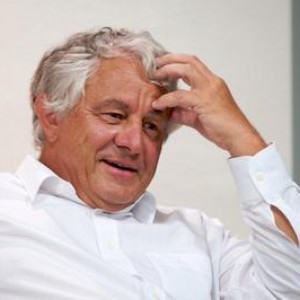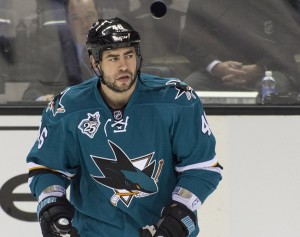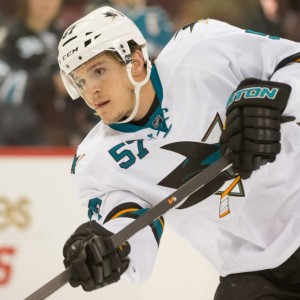The San Jose Sharks are on track for a point total of around 100. Even with nearly four weeks to go in the regular season, they are a virtual lock for a playoff spot. This is nothing new. In the last ten full seasons, the Sharks have averaged 105 points. They’ve missed the postseason only once since he 2002-03 season. These may be improvements over last season’s debacle, but they are decidedly average when placed against the Sharks teams of the past decade.
Perhaps most critical is not the average (by San Jose standards) regular season. What matters now are the trend lines. In short, how many arrows are pointed up as the Sharks approach the postseason?
The answer is a bunch.
The usual suspects continue to roll. Joe Pavelski, Joe Thornton, Marc-Edouard Vlasic, and Brent Burns. But the big guns are not the only important trends heading the right way.
Up arrows were on full display in the Sharks 5-2 win over the league-leading Washington Capitals on Saturday night. Yes, the buzzsaw Caps appeared a bit sluggish at the end of their west coast swing, but their down games have been few and far between. For the Sharks, the win provided reasons for optimism.
The Fans Return
Yes, the Shark Tank sold out against the Caps. And unlike numerous times when the announced crowd was 17,562, this time, it looked like just about all of those 17,562 showed up for the game.

A few years back, Sharks management began making decisions with a common theme: take the fan base for granted. The fans returned that condescension with ambivalence. The venue stopped selling out last season. Season ticket renewals were way down this year. Even when announced attendance suggested the venue was pretty full, a look around sent a different message. The fans weren’t showing up. Attendance declines can get very messy since they have self-reinforcing mechanisms. Publicity-shy owner Hasso Plattner noted this in January when he commented about ticket reselling issues. “If you don’t have enough demand, the season ticket holders can’t sell the tickets if they are not available to go. So that has a double-negative effect.”
It wasn’t simply fans that left and did not return. The energy had left the building. Over the past decade, a sold-out Shark Tank of 17,562 often sounded like 25,000 in the house. In recent times, an announced crowd of 16,000 typically sounded like just 5,000 in the house. Games that came closest to filling the venue often occurred when fans of the opposition showed up in droves.
Sharks management recognized the error of their ways. In his January comments, the owner suggested returning an organ player to the venue. This sort of minor detail nicely symbolizes management’s return to fan appreciation. A live organist adds energy, which helps make the game experience work for fans. The new Sharks organist debuted against the Caps on Saturday.
There have been painfully few games in the past two seasons where the energy in the Shark Tank resembled its former self. Against the Capitals, the Shark Tank was its old rocking self. Evidence proof that life is on its way back. Joe Pavelski recognized that a better team with better results and more consistent effort was a key part of bringing the fans back. While getting the fan base back in full might be a work in progress, Saturday night showed there is considerable progress.
Bringing the fans back is part of the equation, bringing the energy back is the other part. For years, the Shark Tank has been among the toughest venues for opposing teams in all of hockey. Things are not back to where they once were, but the arrow is finally pointing in the right direction.
Road Record

If a team can dominate at home, they become particularly dangerous if they are also able to have success on the road. The Sharks have proven able to win on the road, even as they lead the league in travel miles. Beating good teams on the road is among the toughest tasks in the NHL.
With 37 of 41 road games behind them, the Sharks have only trailed at the end of regulation nine times. Their 25 road wins lead the league. Though they might be overtaken in that category, there is no doubt, they can win on the road. But can they win against the playoff teams?
The Sharks last six road games against playoff-bound teams were against Anaheim, St. Louis, Nashville, Chicago, Tampa Bay and Florida. The Sharks were 4-2 in those games.
A formula of winning at home and competing effectively on the road is powerful. The road arrow has pointed in the right direction all season long.
Schedule Sanity Returns
The Sharks recently completed a positively bizarre segment of their schedule that consumed nearly a quarter of the season. I detailed the issues in this link but suffice it to say that is over.
The Sharks have struggled recently with their power play and penalty kill. Both are solvable. The problem most likely stems from a lack of practice time, something the schedule made particularly difficult. With that issue behind them, the Sharks should be able to address the practice time deficit. The power play should improve and the penalty kill should get a lot better. Just in time for the postseason. A big arrow up.
New Additions
The Sharks added three players at the trade deadline. Depth forward Nick Spaling is off to a respectable start. Back-up goalie James Reimer has delivered; he has yet to allow an even-strength goal in two appearances. This will enable coach Peter DeBoer flexibility in his use of starter Martin Jones down the stretch.

The most critical acquisition is Roman Polak. Polak is in San Jose to fill a deficiency with far-reaching consequences. Not only was the third pair right-handed defenseman considered a weakness, but it was considered a weakness is several ways. Rookie Dylan DeMelo (and prior to that, Matt Tennyson) lacked size, physical toughness, experience, playoff maturity and penalty killing chops. Polak brings all that.
Polak’s start was discouraging. For all the hand-wringing, both Tennyson and DeMelo were solid in their roles. In a combined 62 games, they were plus-1. When not forced to pair with the not-yet-ready Mirco Mueller (primarily Tennyson), they combined to be plus-5. Importantly, both players complemented the Sharks left-handed third pair defenseman, Brenden Dillon. Dillon himself was a plus-7 before Polak joined the team ten games ago, after a minus-11 last season.
Things did not start well for Polak. He had little chemistry with Dillon. Instead of complementing Dillon as Tennyson and DeMelo had, the slow-moving Polak and the slow-moving Dillon routinely got trapped in their own end. Polak somehow managed to be a plus-8 for the train wreck in Toronto. Yet, on a surging Sharks team, Polak’s first nine games included zero points, a minus-4 rating and a broken nose (courtesy of a series of unseemly events during which Polak was choirboy innocent).
In his tenth game in teal against the Caps, Polak turned it around. He was plus-2, but more importantly, he looked good paired with Dillon. While one game is a dangerous sample size, it was against a top team whose fast, physical style resembles that of the California opponents the Sharks can expect to see early in the postseason.
The new additions arrow is pointing in the right direction. If the Polak/Dillon chemistry looks as it did against the Capitals, it will be pointing up a big way.
Health

If there is any area that is notoriously fickle, it is health. Lots of teams have dealt with key injuries. The Sharks, however, are quite healthy. Only backup Matt Tennyson appears out for a while. Tommy Wingels, who has missed a few weeks is apparently close to returning. Wingels, the Sharks top hitter, tends to wear down over the course of a season. Perhaps the time off to recover will be a blessing in disguise for him. San Jose may well be the healthiest team in the league going into the final weeks of the regular season. Health is a major up arrow.
Pointing Up
The Sharks may be focusing on improving their playoff seed, but the reality is simple. The Sharks regular season has already yielded the key result: they will return to the postseason. A higher seed might be nice, but history shows it is not terribly important, bordering on meaningless. What is important, peaking as they head into the postseason.
The game against the Caps showed a difference-making third pair defenseman. It highlighted a rejuvenated fan base. It marked the start of a saner schedule. Add to it a good backup goalie, good health, and a confident road team.
The playoffs in the NHL West are wide open. The differences among the seven Western teams that will be locked into the playoffs shortly are incremental. The team that gets its ‘up arrows’ aligned at the proper time stands a very good chance of emerging from the Western Conference. For San Jose, these up arrows are aligning nicely.
Can’t get enough hockey? Want to talk about it with our writers, and fellow fans? Join The Hockey Writers Group on Facebook today!